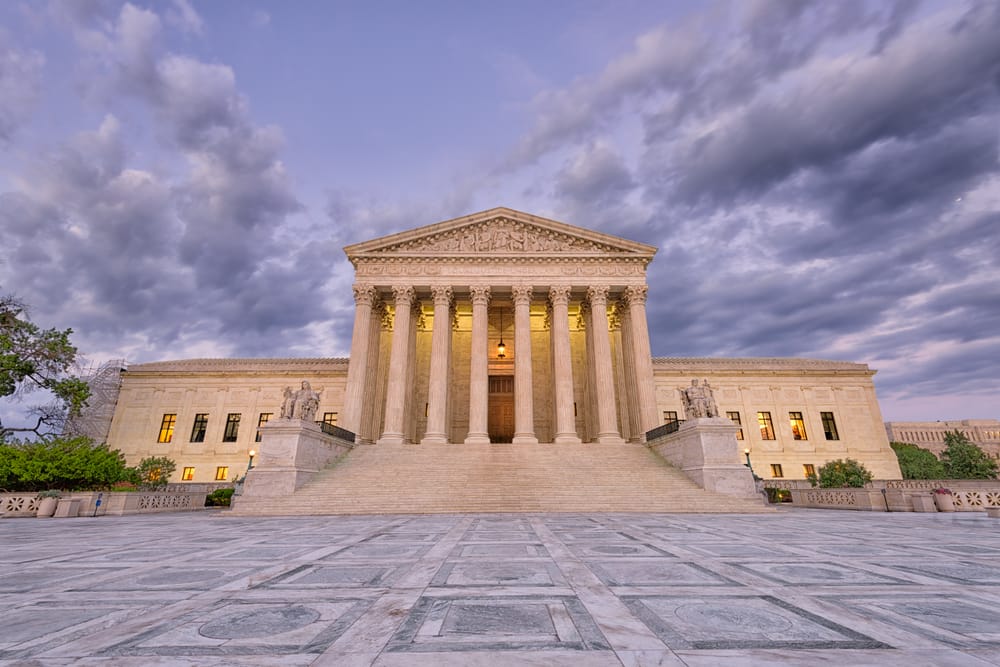Marbury v. Madison (1803): The Genesis of Judicial Review and Its Enduring Legacy
The United States Supreme Court stands as a cornerstone of the American legal framework, wielding profound influence over the interpretation and application of law nationwide. Among its many landmark decisions, none has been more pivotal in defining the contours of constitutional law and delineating the role of the judiciary than Marbury v. Madison (1803). This seminal case not only established the principle of judicial review but also set a precedent that continues to shape the balance of power among the branches of government.
Judicial review, as articulated in Marbury v. Madison (1803), empowers courts to invalidate legislative and executive actions that contravene the Constitution. This doctrine has become a bedrock of U.S. constitutional jurisprudence, influencing countless decisions that have sculpted America's political and social landscape. The case's enduring significance lies in its affirmation of the judiciary's role as a guardian of constitutional principles.
Historical Context and Judicial Innovation
The backdrop to Marbury v. Madison (1803) was the fiercely contested presidential election of 1800, which saw President John Adams defeated by Thomas Jefferson. In his final days in office, Adams appointed several "midnight judges," including William Marbury as Justice of the Peace for Washington D.C. However, Marbury's commission was not delivered by Secretary of State James Madison, prompting Marbury to seek a writ of mandamus from the Supreme Court.
Under Chief Justice John Marshall, the Court faced a conundrum: while Marbury was entitled to his commission, the Judiciary Act provision granting the Court jurisdiction was found to be unconstitutional. This decision marked the first instance where the Supreme Court asserted its authority to strike down an act of Congress, thereby establishing judicial review as a fundamental principle.
Baker v. Carr (1962): Expanding Judicial Reach
The significance of Baker v. Carr (1961) cannot be overstated, as it paved the way for subsequent decisions that further entrenched the principle of "one person, one vote," such as Reynolds v. Sims (1963) and Wesberry v. Sanders (1963). These cases collectively reinforced the judiciary's role in safeguarding electoral equality and ensuring fair representation. By establishing that federal courts could address issues of legislative apportionment, Baker v. Carr (1961) marked a pivotal shift in constitutional jurisprudence, expanding judicial reach into areas previously deemed untouchable and affirming the judiciary's duty to protect individual rights against state inaction or malfeasance.
In a groundbreaking decision, the Supreme Court, led by Justice Brennan, held that challenges to legislative apportionment were indeed justiciable under the Equal Protection Clause. The Court reasoned that the plaintiffs' claims did not present a non-justiciable political question but rather a constitutional issue that warranted judicial intervention. This reasoning was rooted in the principle that the judiciary has a role in ensuring that all citizens' votes carry equal weight, thereby upholding democratic principles. The Court's analysis emphasized that judicially manageable standards existed for resolving such disputes, thus expanding the scope of judicial review and setting a precedent for future cases involving electoral fairness.
The landmark Supreme Court case Baker v. Carr (1961) fundamentally transformed the landscape of American constitutional law by addressing the justiciability of legislative apportionment issues. Prior to this decision, the Court had been reluctant to intervene in what were considered "political questions," as seen in Colegrove Et Al v. Green Et Al (1945). The case arose when Charles Baker and other Tennessee residents challenged the state's failure to reapportion its legislative districts despite significant population shifts, arguing that this neglect violated the Equal Protection Clause of the Fourteenth Amendment. The central legal issue was whether the federal courts had the authority to adjudicate claims of legislative malapportionment, which had traditionally been viewed as a political matter beyond judicial reach.
Cohens v. Virginia (1821): Affirming Federal Supremacy
The significance of Cohens v. Virginia (1821) is profound, as it reinforced the doctrine of federal supremacy and expanded the scope of judicial review to include state court decisions. This case laid the groundwork for future decisions that would continue to delineate the balance of power between state and federal governments, such as McCulloch v. Maryland (1819), which addressed state interference with federal institutions, and Gibbons v. Ogden (1821), which clarified federal authority over interstate commerce. Collectively, these cases contributed to a robust framework for understanding federalism in the United States, ensuring that federal law remains paramount in maintaining national unity and coherence.
The Court's reasoning was grounded in the interpretation of Article III and Article VI of the U. S. Constitution. Marshall emphasized that the Constitution and federal laws are "the supreme Law of the Land," and thus, it is within the purview of the Supreme Court to ensure that state laws do not contravene federal statutes or constitutional provisions. This decision underscored the necessity of a uniform interpretation of federal law across all states, preventing individual states from undermining federal authority. The ruling in Cohens v. Virginia (1821) built upon the precedent set by Marbury v. Madison (1803), which established judicial review, and further solidified the Court's role as the ultimate arbiter in conflicts between state and federal law.
The case of Cohens v. Virginia (1821) stands as a pivotal moment in the affirmation of federal supremacy within the United States legal system. The background of the case involves the Cohen brothers, who were convicted by the state of Virginia for selling lottery tickets authorized by Congress for the District of Columbia. The legal issue at hand was whether the Supreme Court had the jurisdiction to review a state court's decision in a criminal matter where the state itself was a party. Chief Justice John Marshall delivered the opinion of the Court, asserting that the Supreme Court did indeed have the authority to review state court decisions, thereby reinforcing the principle of federal judicial supremacy over state courts.
Dred Scott v. Sandford (1857): A Controversial Exercise
The decision in Dred Scott v. Sandford (1856) had a significant impact on American jurisprudence and society. It invalidated legislative efforts to limit the expansion of slavery and heightened national divisions over the issue. The ruling was eventually overturned by the Civil War and subsequent constitutional amendments, particularly the Thirteenth and Fourteenth Amendments, which abolished slavery and established birthright citizenship. Related cases such as Plessy v. Ferguson (1895), which upheld racial segregation under the "separate but equal" doctrine, and Brown v. Board Of Education (1954), which overturned Plessy and declared segregation unconstitutional, reflect the evolving legal landscape concerning civil rights and equality. The Dred Scott v. Sandford (1856) decision remains a critical study in how judicial interpretations can profoundly influence societal norms and legislative frameworks.
In a controversial decision, the Supreme Court, led by Chief Justice Roger B. Taney, ruled that African Americans, whether enslaved or free, could not be considered citizens of the United States and therefore had no right to sue in federal court. Furthermore, the Court declared that the Missouri Compromise of 1820, which prohibited slavery in certain U. S. territories, was unconstitutional because it violated the Fifth Amendment's protection of property rights. The Court's reasoning was rooted in a narrow interpretation of citizenship and an expansive view of property rights, effectively denying any legal recognition to African Americans and exacerbating sectional tensions leading up to the Civil War.
The case of Dred Scott v. Sandford (1856) stands as one of the most infamous decisions in the history of the United States Supreme Court, primarily due to its profound implications on the issues of slavery and citizenship. The case arose when Dred Scott, an enslaved African American man, sued for his freedom on the grounds that he had lived in free territories with his owner, which he argued made him a free man. The legal issues at the heart of the case included whether Scott was entitled to sue in federal court, whether his residence in free territories made him free, and whether Congress had the authority to prohibit slavery in the territories.
Impact on Modern Jurisprudence
The legacy of Marbury v. Madison (1803) reverberates through modern jurisprudence, with judicial review serving as a critical tool in landmark cases addressing civil rights and individual liberties.
Brown v. Board of Education (1954): Desegregation and Equality
The significance of Brown v. Board Of Education (1954) extends far beyond the realm of education, as it marked a pivotal moment in the American civil rights movement and set a precedent for future rulings on civil rights. It laid the groundwork for challenging segregation and discrimination in other areas, influencing subsequent cases such as Loving v. Virginia (1966), which struck down laws banning interracial marriage, and Regents Of The University Of California v. Bakke (1977), which addressed affirmative action policies. The decision also prompted further legislative and judicial actions aimed at dismantling institutionalized racism, including the Civil Rights Act of 1964 and the Voting Rights Act of 1965, thereby reshaping American jurisprudence and society's approach to equality and justice.
In its unanimous decision, the Court, led by Chief Justice Earl Warren, held that "separate but equal" educational facilities for racial minorities and whites were inherently unequal, and therefore unconstitutional under the Equal Protection Clause of the Fourteenth Amendment. The Court's reasoning was grounded in the detrimental effects that segregation had on African American children, noting that segregation generated a feeling of inferiority that affected their hearts and minds in a way unlikely ever to be undone. This decision effectively overturned the precedent set by Plessy v. Ferguson (1895), which had upheld state laws requiring racial segregation under the "separate but equal" doctrine.
The landmark Supreme Court case Brown v. Board Of Education (1954) addressed the constitutionality of racial segregation in public schools. This case arose from several consolidated cases where African American students had been denied admission to certain public schools based on laws permitting public education to be segregated by race. The central legal issue was whether the segregation of children in public schools solely on the basis of race deprived minority children of the equal protection of the laws guaranteed by the Fourteenth Amendment.
Roe v. Wade (1973): Privacy and Reproductive Rights
The significance of Roe v. Wade (1972) in American jurisprudence cannot be overstated, as it set a precedent for reproductive rights and privacy that influenced numerous subsequent cases. It was reaffirmed in Planned Parenthood v. Casey (1992), which modified the framework by replacing the trimester system with an "undue burden" standard for evaluating state restrictions on abortion. Additionally, Roe has been cited in discussions of personal autonomy and bodily integrity in cases such as Lawrence v. Texas (2002). Despite its controversial nature and ongoing debates about its implications, Roe v. Wade (1972) remains a cornerstone of constitutional law regarding reproductive rights and privacy.
The Court's reasoning in Roe v. Wade (1972) was grounded in the recognition of a constitutional right to privacy, which had been previously articulated in cases such as Griswold v. Connecticut (1964), where the Court struck down a law prohibiting contraceptive use by married couples. In Roe, the Court extended this privacy right to encompass a woman's decision to have an abortion, emphasizing that this right is not absolute and must be balanced against the state's interests in regulating abortions. The trimester framework established by the Court allowed states to impose increasing restrictions on abortion as the pregnancy progressed, with greater deference given to state interests in protecting potential life and maternal health in the later stages of pregnancy.
The landmark Supreme Court case Roe v. Wade (1972) addressed the constitutionality of state laws that restricted access to abortion, framing the issue within the broader context of privacy rights. The case arose when "Jane Roe," a pseudonym for Norma McCorvey, challenged the Texas statutes that criminalized abortion except to save a woman's life. The legal issue at the heart of the case was whether the Constitution recognized a woman's right to terminate her pregnancy by abortion. The Court's decision, delivered by Justice Harry Blackmun, held that the right to privacy, derived from the Due Process Clause of the Fourteenth Amendment, was "broad enough to encompass a woman's decision whether or not to terminate her pregnancy." This decision effectively invalidated many state laws that restricted access to abortion and established a trimester framework to balance the state's interests with a woman's right to privacy.
Obergefell v. Hodges (2015): Marriage Equality
The decision in Obergefell v. Hodges (2014) significantly impacted American jurisprudence by affirming marriage equality as a constitutional right, thereby invalidating state laws prohibiting same-sex marriage across the nation. It marked a pivotal moment in civil rights law, reinforcing the principle that laws infringing on fundamental liberties must meet rigorous scrutiny. The ruling also drew upon and further developed doctrines established in cases like Romer v. Evans (1995), which struck down laws discriminating against homosexuals, and United States v. Windsor (2012), which invalidated federal non-recognition of same-sex marriages. Collectively, these cases underscore an evolving understanding of equality and liberty under the Constitution, reflecting broader societal shifts towards inclusivity and recognition of diverse family structures.
In a 5-4 decision, the Supreme Court held that the right to marry is a fundamental liberty protected by the Constitution, and that this right extends to same-sex couples. Justice Anthony Kennedy, writing for the majority, emphasized that the Due Process Clause guarantees more than just freedom from government interference; it also protects certain personal choices central to individual dignity and autonomy, including intimate choices defining personal identity and beliefs. The Court also found that the Equal Protection Clause prohibits states from denying same-sex couples the same legal recognition afforded to opposite-sex couples. This reasoning built upon precedents such as Loving v. Virginia (1966), which invalidated bans on interracial marriage, and Lawrence v. Texas (2002), which struck down laws criminalizing homosexual conduct.
The landmark Supreme Court case Obergefell v. Hodges (2014) addressed the constitutionality of same-sex marriage bans under the Fourteenth Amendment. The case arose when several same-sex couples challenged the refusal of their home states to recognize marriages legally performed in other jurisdictions. The central legal issue was whether the denial of marriage licenses to same-sex couples violated the Due Process and Equal Protection Clauses of the Fourteenth Amendment. The petitioners argued that marriage is a fundamental right, and denying this right to same-sex couples constituted discrimination based on sexual orientation.
Conclusion
The profound impact and enduring significance of Marbury v. Madison (1803) cannot be overstated. By establishing judicial review, this historic case laid the foundation for a dynamic interplay between law and society, empowering courts to uphold constitutional values against legislative or executive overreach.
From civil rights advancements such as desegregation and marriage equality to maintaining federal supremacy over state laws, Marbury v. Madison (1803) has left an indelible mark on American jurisprudence. Its principles continue to guide Supreme Court decisions today, affirming its place as a cornerstone of legal thought and practice.
Stay Ahead with Etalia.ai
🌟 Discover More with a Subscription 🌟
If you've found this deep dive into Marbury v. Madison (1803) insightful, there's much more to explore with Etalia.ai. Our platform is dedicated to providing meticulously researched content that broadens your understanding of crucial legal and political issues.
✨ Enhanced with AI
This article has been rewritten and enhanced using advanced AI technology to demonstrate improved comprehensiveness, accuracy, and analytical depth while maintaining our scholarly standards.
Originally published: 1/10/2024 | Enhanced: 9/6/2025 | Scheduled for republication: 10/23/2025








